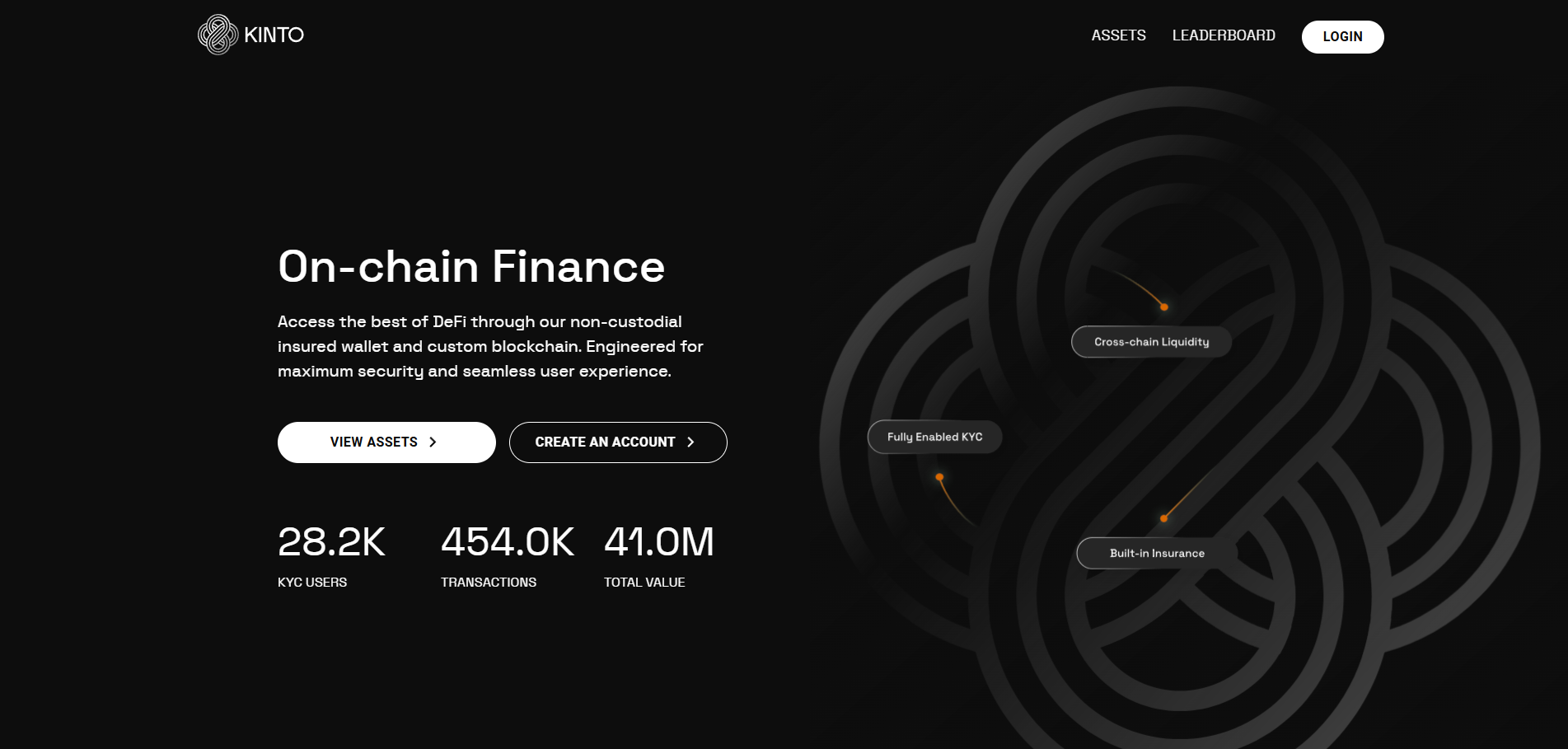Interview with Ramon Recuero - Kinto.xyz


View the Permissionless III Recap
Today, we have the pleasure of speaking with Ramon Recuero, a visionary leader in the tech and blockchain space. Ramon is currently the Co-Founder and CEO of Kinto, a cutting-edge Layer 2 solution designed to provide safe and insured access to financial services on the Ethereum network. His impressive journey in the tech industry began with founding Babylon Finance, a DeFi protocol that successfully amassed over $50 million in assets under management.
Prior to his ventures in blockchain, Ramon honed his skills at renowned companies such as Y Combinator, where he built products and guided emerging founders. He also made significant contributions to well-known tech giants like Google, Moz, and Zynga, leading the development of applications and games that captivated millions.
With a Master’s in Information Technology & Management from the Illinois Institute of Technology and a Bachelor’s in Computer Engineering from Universidad Politécnica de Madrid, Ramon’s academic background is as robust as his professional accomplishments.
Join us as we delve into Ramon’s insights on the future of finance, the evolving landscape of blockchain technology, and the lessons he’s learned throughout his dynamic career.

James (CryptoBit Mag): Let's start with you introducing yourself and your project. Could you also explain what inspired its initial creation?
Ramon: Hi. My name is Ramon. I'm the co-founder and CEO at Kinto.
James (CryptoBit Mag): And why was the platform initially created? What problems does it solve?
Ramon: Before creating Kinto, I was the founder of Babylon Finance. That was an asset management platform on Ethereum, where people could create investment clubs with their friends and then invest in whatever they want, buying this token, investing in Convex, Curve, any protocol they want on Ethereum. We integrated with a bunch of DeFi protocols, and one of them was Rari. That was a protocol that had a billion dollars in assets. And then they got hacked. Because we integrated with them, some of our assets were affected by the hack, and then eventually, it's a long story, but that led to us closing.
It was a really painful experience and life lesson. We realized that users are not going to care about blockchain, crypto, or all the benefits if they're getting hacked, scammed, or rugged. So that's where building Kinto comes in right now. It's a really safe way to access the best opportunities in the Ethereum ecosystem.
James (CryptoBit Mag): Could you clarify how it works with your platform? Do you have custody of user funds, or is it structured differently?
Ramon: It's totally non-custodial. The way it works is through account abstraction. That is this new feature that basically lets users create smart contract wallets like Gnosis Safe. Basically, a user can set several signers. One of them can be your MetaMask. Another one can be your hardware wallet. It can be your Twitter account.
The cool thing about Kinto is, even if you lose everything, because we have KYC but it's still decentralized, you can re-KYC and reset your account. It's totally non-custodial, we don't have access to your assets. And even if you lose everything, you can recover.
James (CryptoBit Mag): Which blockchains are supported on your platform?
Ramon: Right now we're on the Ethereum ecosystem, so we are a layer two on top of it, but we connect with mainnet, with Arbitrum, and with Base.
James (CryptoBit Mag): And on your roadmap, do you plan on extending that over time?
Ramon: Yeah, with Solana, potentially any Bitcoin layer twos.
James (CryptoBit Mag): Do you have any other additional features that you plan on rolling out in the future that are publicly available?
Ramon: Something that we released recently, that we are excited about, is chain abstraction. Because one problem with all DEXes - there are right now more than 100 - is that they recreate the same infrastructure, the same liquidity pools that are already available everywhere. We don't need another USDC-wrapped Bitcoin pool, another USDC pool, because they are from multi-liquidity and mainnet or Arbitrum, they already have the biggest liquidity.
So what we do now is, from Kinto, you can swap wherever the liquidity is, and it's still non-custodial. We bridge, we swap, and we bridge back. So you can still hold the assets on your Kinto wallet that is insured, but you can access the liquidity wherever it is.
James (CryptoBit Mag): Where is your company located?
Ramon: We are fully remote, like many companies in the crypto space. We have a development team that is based in the US, and then we have the foundation that is based offshore.
James (CryptoBit Mag): Are there any social media channels or platforms where people can connect with you or get involved? Do you have a Telegram channel or anything similar?
Ramon: Yes, thank you. Basically, Twitter is the best way. We have @KintoXYZ, and then we have my personal account, @RamonRecuero, my first name and last name altogether. And then our Discord is the best way to get in touch. If you have an issue, feedback, or questions, we are ready to help.
James (CryptoBit Mag): Okay, and you have the Discord link on your website, then?
Ramon: It's on our Twitter, and then on our website as well.
James (CryptoBit Mag): I really appreciate it. Thank you!
Ramon: Thank you. Appreciate it.
Visit and follow Kinto:
https://discord.com/invite/kinto?a=1
https://mirror.xyz/kintoxyz.eth
Exploring Kinto.xyz: Bridging Traditional Finance with DeFi Innovation
In the evolving landscape of digital finance, Kinto.xyz stands out as a pioneering Layer 2 (L2) solution designed to marry the security and compliance of traditional finance with the innovation and accessibility of decentralized finance (DeFi). Here's a dive into what makes Kinto.xyz not just another blockchain platform but a significant step towards mainstream financial integration.
A Safety-First Approach in DeFi
Kinto.xyz introduces itself as the first KYC-compliant L2 network, which is a game-changer for both retail and institutional investors wary of the regulatory grey areas in DeFi. By implementing permissionless KYC/AML protocols, Kinto ensures that all users are verified, drastically reducing the risk of fraud and enhancing trust in the system. This feature alone sets Kinto apart, offering a level of security akin to traditional financial institutions but within the blockchain's decentralized framework.
Insurance and User Security
One of the standout features highlighted by users on platforms like X is Kinto's approach to asset security. Imagine a blockchain where, if your wallet gets compromised, there's an insurance mechanism in place to cover a portion of your assets. Kinto.xyz makes this a reality, offering a safety net that's rare in the crypto world. This insurance-backed security could very well set a new standard for wallet services across the blockchain industry.
User Experience and Accessibility
Kinto isn't just about security; it's also about creating a seamless user experience:
Non-custodial Wallets: Users maintain control over their funds with wallets that are designed for ease of use while ensuring maximum security through features like account abstraction and recovery options.
Integrated Financial Services: From swapping tokens to staking, Kinto's ecosystem is built to facilitate various financial activities within its platform, reducing the need for third-party applications and thereby minimizing risks associated with external integrations.
Mining Program for Sustainable Growth
Kinto's approach to network growth includes a unique mining program, allocating a significant portion of its token supply to users, capital allocators, and developers. This strategy not only incentivizes participation but also ensures the network's growth is community-driven and sustainable over the long term.
Why Kinto.xyz Matters
In a world where DeFi often feels like the Wild West, Kinto.xyz introduces a structured yet innovative approach:
Regulatory Compliance: By integrating KYC and AML, Kinto opens the door for more traditional investors and institutions to enter the DeFi space confidently.
Insurance: It addresses one of the biggest fears in crypto - loss of assets due to security breaches.
Community Growth: Through its token allocation, it encourages ecosystem development, ensuring that the platform grows not just in technology but in community strength.
Kinto.xyz might just be the bridge we need for a broader adoption of blockchain technologies in everyday finance, blending the best of both worlds to create a safer, more user-friendly, and integrated financial landscape.
What is Kinto.xyz?
Kinto.xyz is described as a Layer 2 blockchain solution designed to integrate traditional finance with decentralized finance (DeFi), offering features like permissionless KYC/AML and account abstraction.
How does KYC/AML work on Kinto without compromising decentralization?
Kinto implements a user-owned KYC process, which likely means users verify their identity once, and this verification can be used across services within the Kinto ecosystem without repeatedly sharing personal documents.
What is Account Abstraction on Kinto?
Account Abstraction allows for more flexible and user-friendly wallet management, where users might not deal directly with the complexities of blockchain interactions, like gas fees or transaction processes.
Is there any insurance for assets on Kinto?
While specific details on insurance weren't directly provided, the mention of security measures suggests there might be mechanisms or features aimed at asset protection or recovery.
How can I participate in the Kinto mining program?
Users can participate by engaging in specific activities or contributing to the network, as seen with programs like Engen, where activities earn participants credits or tokens.
What are the benefits of using Kinto over other blockchain networks?
Kinto focuses on security, user experience through account abstraction, and integrating traditional finance mechanisms like KYC, potentially making it more appealing for mainstream adoption and traditional investors.
Can I recover my account if I lose access?
Given Kinto's emphasis on user security, there's likely a system in place for account recovery, possibly through social recovery or other innovative methods of key management.
What tokens or cryptocurrencies are used on Kinto?
The native token seems to be referred to as $KINTO, used within its ecosystem for transactions, staking, or governance.
How does Kinto ensure transaction security and user privacy?
Besides KYC, Kinto might use advanced cryptographic techniques like those seen in smart accounts for transaction security, while privacy might be managed through how identity information is handled on-chain.
When is the full mainnet launch of Kinto?
The mainnet was planned for launch at the end of Q1 2024, according to previous updates.














Discussion